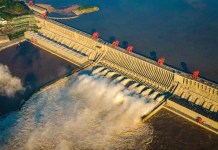A BAE Systems delegate confirmed that they are offering its Queen Elizabeth Class (QEC) aircraft carrier design to the Indian Navy. Speaking at the 2019 Langkawi International Maritime and Aerospace (LIMA) exhibition last week, BAE officials confirmed the news, according to media reports.
Uzbekistan a Key Cog in the Wheel for India’s Central Asia Policy
India currently has one aircraft carrier in service, the 45,000 ton former Soviet Kiev-class Admiral Gorshkov, now known as the INS Vikramaditya, which accommodates embarked MiG-29K fighters and helicopters. The country is also building a second carrier, the 40,000 tonne INS Vikrant, in a local shipyard and this vessel is expected to begin sea trials in 2020.
However, the Indian Government also has a requirement for a third, larger, carrier in the 65,000 tonne class, to be known as the INS Vishal. Like Vikrant, the ship will be built locally, in the Cochin shipyard.
The BAE Systems representative at LIMA said the company has already held talks with the Indian Navy about the potential for a Military Off the Shelf (MOTS) derivative of the Royal Navy’s 65,000-tonne Queen Elizabeth Class design, adapted to meet Indian requirements.
“BAE Systems is pleased to have begun discussions with India about the potential for basing development of the second Indigenous Aircraft Carrier (IAC-2) project on the Queen Elizabeth class design,” the representative said. “The design is adaptable to offer either ski-jump or catapult launch and can be modified to meet Indian Navy and local industry requirements.”
The company has enjoyed recent international success in the export of its Global Combat Ship (Royal Navy Type 26) anti-submarine warfare frigate design to Australia and Canada, for manufacture in local shipyards.
“The UK carrier design has now been proven at sea and is a near match to the Indian Navy’s requirement for a 65,000-tonne carrier with Integrated Full Electric Propulsion (IFEP), that could be constructed under the country’s ‘Make in India’ program,” the representative said.
He said that BAE Systems believes the risks, costs and timetable for the IAC-2 program would be “significantly reduced” by co-operation with the UK.
“Whether this be at government, Navy, prime or sub-contractor level,” he added. “The distributed build of a large complex carrier, having been successfully demonstrated in the UK, could potentially assist public and private Indian shipyards in sharing roles and responsibility for construction of this important strategic asset.”
ADM understands that Indian Navy officials have recently visited BAE Systems’ shipyard at Rosyth, near Edinburgh, where HMS Queen Elizabeth and her sister, HMS Prince of Wales, were completed.




